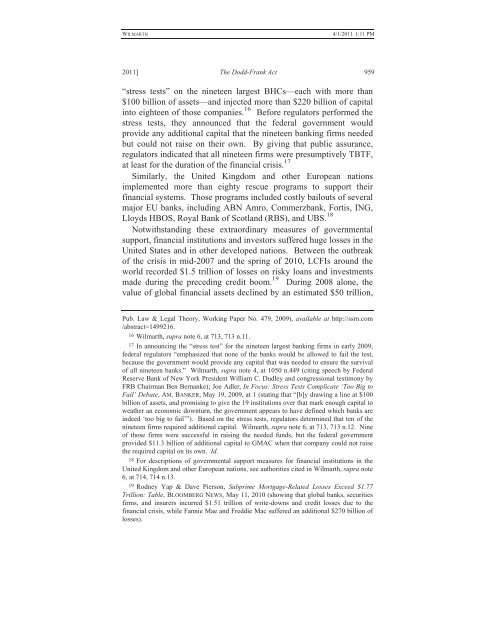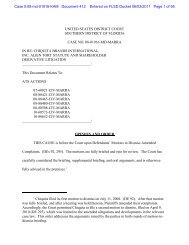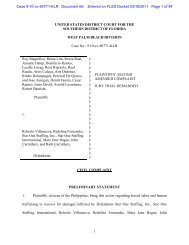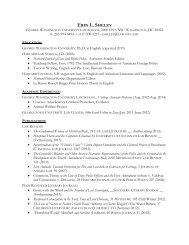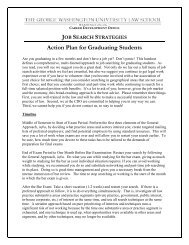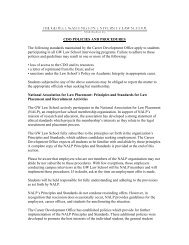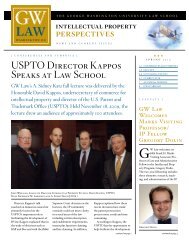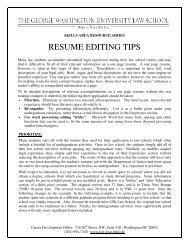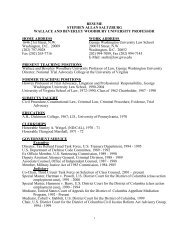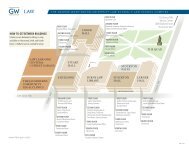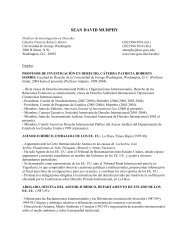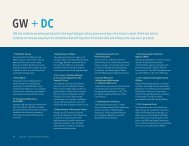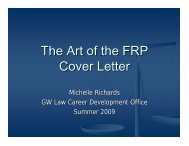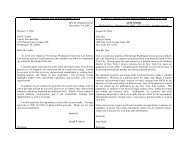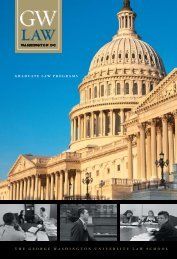CLE Materials for Panel #1 - George Washington University Law ...
CLE Materials for Panel #1 - George Washington University Law ...
CLE Materials for Panel #1 - George Washington University Law ...
Create successful ePaper yourself
Turn your PDF publications into a flip-book with our unique Google optimized e-Paper software.
WILMARTH<br />
4/1/2011 1:11 PM<br />
2011] The Dodd-Frank Act 959<br />
“stress tests” on the nineteen largest BHCs—each with more than<br />
$100 billion of assets—and injected more than $220 billion of capital<br />
into eighteen of those companies. 16 Be<strong>for</strong>e regulators per<strong>for</strong>med the<br />
stress tests, they announced that the federal government would<br />
provide any additional capital that the nineteen banking firms needed<br />
but could not raise on their own. By giving that public assurance,<br />
regulators indicated that all nineteen firms were presumptively TBTF,<br />
at least <strong>for</strong> the duration of the financial crisis. 17<br />
Similarly, the United Kingdom and other European nations<br />
implemented more than eighty rescue programs to support their<br />
financial systems. Those programs included costly bailouts of several<br />
major EU banks, including ABN Amro, Commerzbank, Fortis, ING,<br />
Lloyds HBOS, Royal Bank of Scotland (RBS), and UBS. 18<br />
Notwithstanding these extraordinary measures of governmental<br />
support, financial institutions and investors suffered huge losses in the<br />
United States and in other developed nations. Between the outbreak<br />
of the crisis in mid-2007 and the spring of 2010, LCFIs around the<br />
world recorded $1.5 trillion of losses on risky loans and investments<br />
made during the preceding credit boom. 19 During 2008 alone, the<br />
value of global financial assets declined by an estimated $50 trillion,<br />
Pub. <strong>Law</strong> & Legal Theory, Working Paper No. 479, 2009), available at http://ssrn.com<br />
/abstract=1499216.<br />
16 Wilmarth, supra note 6, at 713, 713 n.11.<br />
17 In announcing the “stress test” <strong>for</strong> the nineteen largest banking firms in early 2009,<br />
federal regulators “emphasized that none of the banks would be allowed to fail the test,<br />
because the government would provide any capital that was needed to ensure the survival<br />
of all nineteen banks.” Wilmarth, supra note 4, at 1050 n.449 (citing speech by Federal<br />
Reserve Bank of New York President William C. Dudley and congressional testimony by<br />
FRB Chairman Ben Bernanke); Joe Adler, In Focus: Stress Tests Complicate ‘Too Big to<br />
Fail’ Debate, AM. BANKER, May 19, 2009, at 1 (stating that “[b]y drawing a line at $100<br />
billion of assets, and promising to give the 19 institutions over that mark enough capital to<br />
weather an economic downturn, the government appears to have defined which banks are<br />
indeed ‘too big to fail’”). Based on the stress tests, regulators determined that ten of the<br />
nineteen firms required additional capital. Wilmarth, supra note 6, at 713, 713 n.12. Nine<br />
of those firms were successful in raising the needed funds, but the federal government<br />
provided $11.3 billion of additional capital to GMAC when that company could not raise<br />
the required capital on its own. Id.<br />
18 For descriptions of governmental support measures <strong>for</strong> financial institutions in the<br />
United Kingdom and other European nations, see authorities cited in Wilmarth, supra note<br />
6, at 714, 714 n.13.<br />
19 Rodney Yap & Dave Pierson, Subprime Mortgage-Related Losses Exceed $1.77<br />
Trillion: Table, BLOOMBERG NEWS, May 11, 2010 (showing that global banks, securities<br />
firms, and insurers incurred $1.51 trillion of write-downs and credit losses due to the<br />
financial crisis, while Fannie Mae and Freddie Mac suffered an additional $270 billion of<br />
losses).


